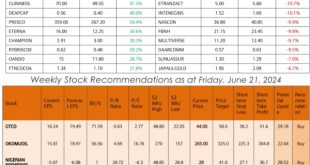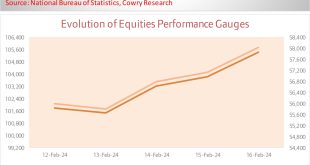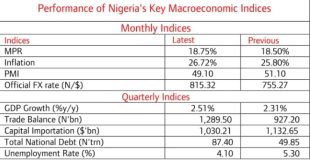
Cowry Research opines that Nigeria should urgently diversify its economy by incentivizing private sector investments in agriculture, manufacturing, and technology to help mitigate the country’s heavy reliance on oil, which has proven vulnerable to global price fluctuations. Also, fiscal reforms should be implemented to enhance revenue generation and rationalize subsidies gradually, while maintaining prudent budget management to ensure fiscal sustainability.
EQUITIES MARKET: Market Stays Upbeat by 0.11% w/w Amid Tepid Trading Activity….

In the upcoming week, Market sentiment is expected to remain mixed as investors engage in bargain hunting and adjust their portfolios in anticipation of Q3 corporate earnings reports. The ongoing sector rotation is also a focal point, with all eyes on the upcoming monetary policy meeting convened by the Central Bank of Nigeria (CBN).
FOREX MARKET: Demand Pressure Abates Across FX Markets as Naira Edges Dollar…..

In the coming week, Cowry Research anticipate the naira to trade in a relatively calm and positively band barring any further market distortion. Also, market players are expectant of policy direction from the apex bank while all eyes stay in wait on the MPC for next meeting.
MONEY MARKET: System Liquidity Tumbles as Banks Get CBN’s N700bn CRR Debit ..
In Looking ahead into the new week, the Nigerian Treasury bills market is expected to remain active as the Central Bank of Nigeria plans to roll over maturing bills totaling N36.56 billion. These bills include 91-day bills worth N2.78 billion, 182- day bills worth N3.02 billion, and 364-day bills worth N30.76 billion. In addition, N10 billion in Open Market Operation (OMO) maturities are expected in the coming week, which should help maintain system liquidity. However, we anticipate that stop rates for these issuances may rise due to tightening liquidity conditions and expectations for the Central Bank to narrow the interest rate corridor, causing interest rates to increase across the board.
BOND MARKET: Secondary Market Yields Exhibit Positive Outing on Buy Sentiments…
In the new week, we expect the FGN Bonds market to maintain a relatively stable outlook, and it’s anticipated that bond yields will remain within their current range.…
ECONOMY: Nigeria’s Economic Recovery Escapes Grasp Amidst Mounting Risks for SSA’s Lost Decade….
In a recent report released by the World Bank Group, Nigeria’s economic growth expectations for 2023 have been revised downward to 2.9%. This adjustment is attributed to the combination of lower international oil prices and currency pressures, which are affecting both the oil and non-oil sectors of the Nigerian economy.
Specifically, Nigeria has struggled to meet its OPEC+ quota due to capacity constraints and the impact of declining global oil prices. Additionally, the World Bank’s bi-annual publication suggests that non-oil activities, particularly in the industry and services sectors, will continue to provide support for the country’s economic growth. However, it also highlights that short-term challenges may arise from policy actions such as the removal of fuel subsidies and the unification of exchange rates.
Examining Nigeria’s recent economic performance, the report indicates that the country saw a 2.5% year-on-year growth in the second quarter of 2023. Although this represented a slight improvement from the previous quarter, it was notably lower than the 3.5% growth observed in the same quarter of 2022. Economic activities, as evidenced by the Purchasing Managers’ Index (PMI) data for August, remained weak, driven by waning business confidence and rising input costs.
Furthermore, the report highlights that Nigeria’s cash crunch issue, witnessed earlier in the year, began to ease as the central bank extended the deadline for exchanging old naira notes for new ones until the end of the year. This extension supported economic activity, with a 3.6% year-on-year growth in the non-oil economy, particularly driven by the services sector. However, the underperformance of the oil sector continued to hold back overall economic growth, contracting by 13.4% year-on-year. Taking a broader view of the sub-Saharan African region, the World Bank paints a challenging outlook. It anticipates a slowdown in economic growth for the region, projecting a rate of 2.5% for 2023 compared to 3.6% in 2022. Per capita growth in Sub-Saharan Africa has remained stagnant since 2015, and the region is expected to contract at an average annual rate of 0.1% per capita from 2015 to 2025. The Eastern and Southern Africa subregion is expected to grow at 1.9% in 2023, down from 3.5% in 2022, while the Western and Central Africa subregion is forecasted to achieve 3.3% growth in 2023, down from 3.8% in 2022.
Despite these challenges, the World Bank identifies “pockets of resilience” in the region. In 2023, the Eastern African community is expected to achieve a growth rate of 4.9%, and the West African Economic and Monetary Union (WAEMU) is projected to grow by 5.1%. The report also notes that certain countries, such as Benin, Côte d’Ivoire, Ethiopia, Mauritius, Rwanda, and Uganda, have demonstrated economic resilience, with growth rates exceeding 2.5% both before and after the pandemic. However, concerns remain regarding the quality and sustainability of this growth in the future.
Looking ahead to 2024-2025, the World Bank projects an average economic growth rate of 3.7% for Nigeria. This anticipated growth will be driven by key sectors including services, trade, construction, manufacturing, and agriculture. While oil production is expected to recover during this period, it is likely to remain below OPEC+ quotas. Additionally, with the ramp-up in production of a new refinery, fuel product imports are expected to decline.
Cowry Research opines that Nigeria should urgently diversify its economy by incentivizing private sector investments in agriculture, manufacturing, and technology to help mitigate the country’s heavy reliance on oil, which has proven vulnerable to global price fluctuations. Also, fiscal reforms should be implemented to enhance revenue generation and rationalize subsidies gradually, while maintaining prudent budget management to ensure fiscal sustainability. In addition, exchange rate unification must be carefully managed to stabilize the currency and attract foreign investment. Finally, improving infrastructure, maintaining a balanced monetary policy, and ensuring transparency and good governance practices are crucial components of a comprehensive strategy to foster economic growth and stability in Nigeria.
EQUITIES MARKET: Market Stays Upbeat by 0.11% w/w Amid Tepid Trading Activity….
The local bourse closed the week on a positive note as the ASI inched by 0.11%week on week to 66,454.57 points as investors continue to take position in fundamentally sound stocks spurred by the Q3 earnings season expectations while all eyes stay gaze on the CBN for the next MPC meeting. In tandem with the ASI, the total market capitalization of listed equities experienced an advancement by 0.11% week-on-week to N36.51 trillion as the year-to-date return of the All-Share Index (ASI) remained at 29.67%.
Across the sectoral front, performance was in the mix-bargain as the see-saw movement continues across tickers. The Insurance and Industrial goods sectors were the lagging indices as they posted losses by 3.11% and 1.38% week on week. On the flip side, the Banking and the consumer goods sector garnered gains by 1.43% and 0.17% accordingly while the Oil & Gas index closed flat despite sell-off in OANDO.
Trading activity throughout the week remained characterized by positive sentiments, as evidenced by the weekly tally of deals which inched by 0.32% weekon-week to 27,964 deals. Moreover, the average traded volume witnessed a weekly uptrend by 80.02%, settling at 2.41 billion units while the weekly average value rose positively by 23.44% week on week, and reaching a value of N22.12 billion.
At the close of the week, IKEJAHOTEL, ETERNA and JBERGER were the major toast of investors amid the bargain hunting activities as their share prices advanced by +26%, +15%, and +6% respectively while the laggards for the week were OANDO, UNITYBNK, and MTN whose prices nosedived by -24%, -10% and -7% week on week.
In the upcoming week, Market sentiment is expected to remain mixed as investors engage in bargain hunting and adjust their portfolios in anticipation of Q3 corporate earnings reports. The ongoing sector rotation is also a focal point, with all eyes on the upcoming monetary policy meeting convened by the Central Bank of Nigeria (CBN). Meanwhile, we continue to advise investors on taking positions in stocks with sound fundamentals.
FOREX MARKET: Demand Pressure Abates Across FX Markets as Naira Edges Dollar…..
This week, the Naira exhibited strength at the official and the parallel markets against the United States’ dollar on the back of cooling demand pressure for the local currency across the board. Thus, the naira edged the dollar by 1.78% week-on-week at the official market, closing at N741.85/$1. Also, at the parallel market, the naira appreciated by 0.79% week-on-week to 1,000/$1 as demand pressure ease from fx users.
Meanwhile, it was a mixed outing at the FMDQ Securities Exchange (SE) FX Futures Contract Market, where the dollar gained across the mid to long end of the curve against the local currency. Notably, forward rates appreciated in favour of the dollar by 0.22%, 2.01%, and 3.06% accordingly while at the 1-month and 2-month forward contracts, the dollar skidded by 0.61%, and 0.06% week on week in that order to close at N786.31/$1 and N796.83/$1.
This week witnessed a significant decline in oil prices, primarily driven by the surge in fuel inventories and mounting apprehensions regarding demand . West Texas Intermediate (WTI) plummeted to $82.50, while Brent crude traded at $84.23. meanwhile, there remain certain fundamental indicators suggesting a potential uptrend in prices in the coming week. Additionally, the price of Nigerian Bonny Light crude oil closed below the $100 mark, falling to $93.26 per barrel as demand fears begin to creep into the market.
In the coming week, Cowry Research anticipate the naira to trade in a relatively calm and positively band barring any further market distortion. Also, market players are expectant of policy direction from the apex bank while all eyes stay in wait on the MPC for next meeting.
MONEY MARKET: System Liquidity Tumbles as Banks Get CBN’s N700bn CRR Debit ..
In the just concluded week, we saw yields in the secondary market trended lower for most maturities tracked. Notably, NITTY for 1 month, 6-months and 12 months maturities crashed to 3.16% (from 3.38%), 7.03% (from 7.13%), and 12.56% (from 13.94%) respectively. Also, the weekly NIBOR moved on mixed direction on the back of reduction in the financial system liquidity. The reduction in the liquidity level was due to a system CRR debit of about N700 billion. Consequently, the Overnight NIBOR stayed tanked from the prior week by 1.67% points, while the 1-month, 3-months and 6-months maturities cleraed higher by 0.83% points, 1.33% points and 1.75% points to 8.33%, 10.00% and 11.42% respectively.
Looking ahead into the new week, the Nigerian Treasury bills market is expected to remain active as the Central Bank of Nigeria plans to roll over maturing bills totaling N36.56 billion. These bills include 91-day bills worth N2.78 billion, 182-day bills worth N3.02 billion, and 364-day bills worth N30.76 billion. In addition, N10 billion in Open Market Operation (OMO) maturities are expected in the coming week, which should help maintain system liquidity. However, we anticipate that stop rates for these issuances may rise due to tightening liquidity conditions and expectations for the Central Bank to narrow the interest rate corridor, causing interest rates to increase across the board.
BOND MARKET: Secondary Market Yields Exhibit Positive Outing on Buy Sentiments…
This week, the yields on FGN bonds traded largely positive at the secondary market as well saw postive sentiment and buy interets across the short to mid end of the curve pushed yields lower by a paltry 2bps week-on-week. Meanwhile, the MAR2027, and the MAR-2037 debt instruments saw their corresponding yields closing the week at 13.58%, and 15.42% respectively as investors took positions. During the week, the Debt Management Office (DMO) has unveiled its FGN Bonds Issuance Calendar for the fourth quarter of 2023. During this quarter, the DMO plans to offer bonds with a total worth ranging from N960 billion to N1.20 trillion. These bonds will be made available through the reopening of various tenors, including: 1. 10-Year FGN APR 2029: With an offering size between N240 billion and N300 billion. 2. 10-Year FGN JUN 2033: Also, with an offering size between N240 billion and N300 billion
3. 15-Year FGN JUN 2038: With a similar offering size between N240 billion and N300 billion. 4. 30-Year FGN JUN 2053: Again, with an offering size ranging from N240 billion to N300 billion. Meanwhile, the FGN Eurobonds traded in the international capital market in the bearish region on the back of rising oil prices, and mild sell sentiment as their yields cleared higher at the close of the week by 1.71% points, 1.29% points and 1.18%.
In the new week, we expect the FGN Bonds market to maintain a relatively stable outlook, and it’s anticipated that bond yields will remain within their current range.…
 MMS PLUS NG – Maritime, Aviation, Business, Oil and Gas News Online Newspaper with coverage in Maritime, Oil and Gas, Aviation, Power and Energy as well as Financial News
MMS PLUS NG – Maritime, Aviation, Business, Oil and Gas News Online Newspaper with coverage in Maritime, Oil and Gas, Aviation, Power and Energy as well as Financial News





